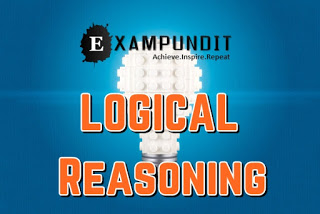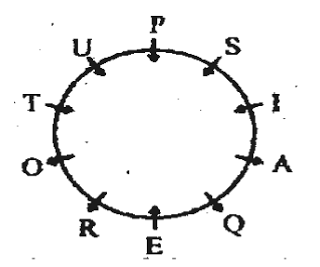Hello and welcome to ExamPundit. Here is a set of Reasoning Quiz for Bank Exams 2015. The set is based on Seating Arrangements and Data Sufficiency Problems.
Directions (Q.
No.1-5): Read the following information carefully and answer the questions
given below:
No.1-5): Read the following information carefully and answer the questions
given below:
10 friends (5 boys P, Q, R, S and
T and 5 girls A, E, I, O and U) are playing a game and they are sitting in a
circle. The distance between every two friends is equal. Two boys and two girls
are facing opposite to the centre of the circle and other 6 friends are facing
towards the centre of the circle. A is fourth to the left of O, who is third to
the right of P. R is second to the right of T, who is not near to E. There are
three friends between I and R, S is second to the left of U and facing the
centre of the circle. P and E are sitting opposite and facing each other. I is
second to the left of Q. A is facing opposite to the centre of the circle. More
than three boys or girls are not sitting together. Not more than two friends
who are facing opposite to the centre of the circle are sitting together.
T and 5 girls A, E, I, O and U) are playing a game and they are sitting in a
circle. The distance between every two friends is equal. Two boys and two girls
are facing opposite to the centre of the circle and other 6 friends are facing
towards the centre of the circle. A is fourth to the left of O, who is third to
the right of P. R is second to the right of T, who is not near to E. There are
three friends between I and R, S is second to the left of U and facing the
centre of the circle. P and E are sitting opposite and facing each other. I is
second to the left of Q. A is facing opposite to the centre of the circle. More
than three boys or girls are not sitting together. Not more than two friends
who are facing opposite to the centre of the circle are sitting together.
1. Which two girls
are sitting facing opposite to the centre of the circle?
are sitting facing opposite to the centre of the circle?
(a) I and U
(b) O and A
(c) E and I
(d) O and E
(e) O and I
2. Which of the
following boys is not sitting between two girls?
following boys is not sitting between two girls?
(a) P
(b) Q
(c) R
(d) S
(e) Both P and S
3. What is the
position of I vis-à-vis A?
position of I vis-à-vis A?
(a) Immediate left
(b) Immediate right
(c) Opposite
(d) A and C
(e) None of these
4. Which two boys are
facing opposite to the centre of the circle?
facing opposite to the centre of the circle?
(a) R and Q
(b) Q and P
(c) R and T
(d) Can’t be determined
(e) All of the above are possible
5. How many persons
are sitting between S and Q?
are sitting between S and Q?
(a) Four
(b) Three
(c) Two
(d) One
(e) Either A or C
Directions (Q. 6-10): A question followed by two statements numbered I
and II is given below. The question
may or may not be answered with the help of these statements. You have to
decide if these statements are
sufficient to answer the question. Give answer:
and II is given below. The question
may or may not be answered with the help of these statements. You have to
decide if these statements are
sufficient to answer the question. Give answer:
(a) if only statement I is sufficient to answer the
questions but statement II is not
questions but statement II is not
(b) if only statement II is sufficient to answer the
questions but statement I is not
questions but statement I is not
(c) if either statements I or II is sufficient to answer the
question
question
(d) if the two statements are not sufficient but still more
data is needed to answer the question
data is needed to answer the question
(e) if both statements I and II are together sufficient to
answer the question
answer the question
6. In which year was
Ratul born?
Ratul born?
Statements:
I. Ratul at present is 25 years younger to his mother.
II. Ratul’s brother, who was born in 1964, is 35 years
younger to his mother.
younger to his mother.
| Solutions -From both I and II, we find that Ratul is (35-25) = 10 years older than his brother, who was born in 1964. So, Ratul was born in 1954. |
|---|
7. How many children
does M have?
does M have?
Statements:
I. H is the only daughter of X who is wife of M.
II. K and J are brothers of M.
| Solutions – From I, we conclude that H is the only daughter of M. But this does not indicate that M has no son. The information given in II is immaterial. |
|---|
8. The last Sunday of
March, 2006 fell on which date?
March, 2006 fell on which date?
Statements:
I. The first Sunday of that month fell on 5th.
II. The last day of that month was Friday.
| Solutions – From I, we conclude that 5th, 12th, 19th and 26th of March, 2006 were Sundays. So, the last Sunday fell on 26th. From II, we conclude that 31st March, 2006 was Friday. Thus, 26th March, 2006 was the last Sunday of the month. |
|---|
9. Question: What is
the code for ‘sky’ in the code language?
the code for ‘sky’ in the code language?
Statements:
I. In the code language, ‘sky is clear’ is written as ‘de ra
fa’.
fa’.
II. In the same code language, ‘make it clear’ is written as
‘de ga jo’.
‘de ga jo’.
| Solutions – The only word common to I and II is ‘clear’ and as such, only the code for ‘clear’ can be ascertained from the given information. |
|---|
10. Question: How
many children are there between P and Q in a row of children?
many children are there between P and Q in a row of children?
Statements:
I. P is fifteenth from the left in the row.
II. Q is exactly in the middle and there are ten children
towards his right.
towards his right.
| Solutions – From II, Q being in the middle, there are 10 children to his right as well as to his left. So, Q is 11th from the left. From I, P is 15th from the left. Thus, from both I and II, we conclude that there are 3 children between P and Q. |
|---|
Winners of this Quiz:
- Raven92/Ankit
- Natkhat S@M
- Sayan/Ratul
Regards
function answer(id){
if(document.getElementById(id).style.display == “block”){
document.getElementById(id).style.display = “none”;
}else{
document.getElementById(id).style.display = “block”;
}
}
#a1{display:none;}
#a2{display:none;}
#a3{display:none;}
#a4{display:none;}
#a5{display:none;}
#a6{display:none;}
Team ExamPundit
Sponsored
(adsbygoogle = window.adsbygoogle || []).push({});
Books For 2015 Banking/Insurance Exams





